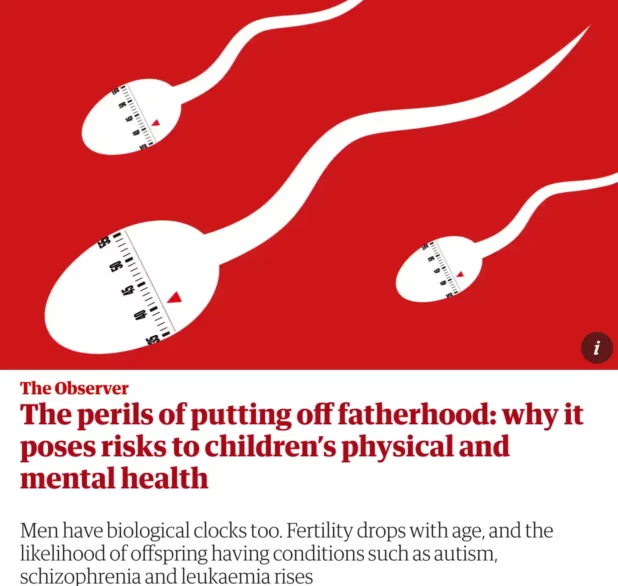The Guardian has published some more forced-memed bullshit.
They’re claiming that older men shouldn’t have kids, based on some study that doesn’t mention the age of the women. The only possible real study would control for the age of the women, as well as every other factor: more or less identical teenage girls and men of various ages but of a similar level of physical fitness. The men also all would have had to have not worked in chemical plants or otherwise been exposed to industrial chemicals, not taken steroids, etc. There are a lot of things that a lot of older men have been through that could change sperm quality that do not amount to “it’s the age.”
Of course, that is all too much to say, given that they are literally not controlling for the age of the woman, and given that in Western, feminist society, virtually all marriages are within a pretty tight age bracket, and the women are almost certainly older with the older men.
For those who don’t know: traditional wisdom says that (all things being equal) male sperm quality doesn’t change at all, and the only male barrier to fatherhood is the ability to maintain an erection.
Alison Motluk writes for The Guardian:
When we think of the effects of age on baby-making, we tend to focus on women. That withering supply of eggs. Those chromosomal problems. Infertility. But men are affected by age too. There is now a substantial – and growing – body of evidence that suggests delaying fatherhood may carry its own consequences. These are seldom talked about – how often, for example, are men told to “pay more attention” to their biological clocks?
Because they work, you stupid bitch.
Nor, generally, are fertility services discouraged for older men wanting to be fathers in the way some countries do for older women who want to be mothers. In England and Wales, for example, the National Institute for Clinical Excellence recommends that the NHS does not offer IVF to women over 42, but no mention is made of paternal age in its guidance. Nor is there an agreed definition of “old” when it comes to fathers.
Yet we know that some time about the age of 40, men’s sperm start to get slower. Conception gets harder. And children born to older fathers face higher rates of conditions such as autism, schizophrenia and leukaemia.
Show your work, you dumb hoe.
How do we know that? Where is the controlled study or controlled research analysis?
Afghanistan exists – it’s a place where 14-year-old girls from the same village are getting pregnant by men who are 17 and 77. The data is waiting for you to go retrieve it. The Afghans would participate in 30-year studies if you paid them like, $11.
Trillions of dollars are spent on medical research, particularly now on genetic research, but no one wants to collect that data, let alone do the study?
But you want to publish articles making claims of positive knowledge?
In many countries, men are becoming fathers at older ages. In America, for example, in 1980 about 43 in 1,000 babies were born to men aged between 35-49; by 2015 this had jumped to about 69 in 1,000 babies.
See!
She doesn’t mention the women’s age!
There is no study! No research data!
Age affects the sperm itself. A large systematic review published in 2015, looking at 90 separate studies involving 93,839 subjects, found that a man’s age negatively affected measures of sperm quality – the way sperm looked, how well they moved, and how many were damaged.
Not controlled, low sperm mobility does not equal genetic damage.
I guess I didn’t explain that above: all the sperm does is deposit genetic material, and this means it’s effectively just a line of code. The sperm, once delivered, would need to be delivering damaged genetic material. Everything else is on the woman.
So the basic question is: does the genetic quality of sperm somehow degrade with age? Various types of chemical exposure do cause genetic damage. That’s more or less what a cancer is: the genes start mutating and writing bad code into cells. (Please, if you’re a doctor or scientist, don’t akshually me – you know that the concept I just communicated is basically correct, if over-simplified. This isn’t a medical journal, we’re doing big ideas.)
The physical attributes of the sperm can be important when it comes to conceiving a child. Research suggests conception rates for older men are lower than for younger men. In a study of 2,112 UK couples, men over 45 were nearly five times more likely to take more than a year to conceive compared with men aged under 25, and this held true even when the female partner was young.
Okay, so that time we have the age of the female. (These are all separate studies she is citing, and I’ve seen the data before, because they’ve tried to push this “old sperm” meme in various media before.)
If they have the conception rate with control for female age, why don’t they have anything else controlled for female age?
Time to conception is not relevant to the question of the genetic fidelity of the fetus. You follow? Sperm count and mobility does decline with age. And again, in this case, there is no control on chemical exposure, drug use, etc. I don’t know that I believe this “five times more likely to take more than a year” data at all, for the simple reason that none of this is especially serious. But it proves nothing anyway, while being far and above the single most valid/viable data point.
You get the idea. The article is long and contains more references that don’t really mean anything. It’s a narrative, which is anti-male, anti-natal, and anti-family.
How about: show the divorce data on age gap and male income level? That’s probably more concerning to the people than some voodoo manipulated sperm data.
At this point, if you were actually concerned about this sperm quality issue, you’d have to go to anecdotal evidence. Look at examples of men with old or even elderly fathers.
As stated: the frustrating part is that an actual study could be done in Afghanistan, where there are still men in their sixties and seventies marrying teenage girls. The war is over, and you could do a research study. Young men are also having kids in the country. Give the kids various genetic tests.
I am legit non-ideological in my conviction that the erection is the metric. I don’t believe in viagra, and in fact find it bizarre and disgusting. The idea of having a sex drive without an erection is nonsensical, so it’s like: what are you trying to do here exactly, big guy?
I guess if the answer was “I’m trying to get this woman pregnant,” I would pause, but obviously most viagra usage is some pitiful obese boomer attempting to “return to the 1960s.”
Further, you can read stories about men in their 80s having kids without viagra.
Elvis Dunderhoff contributed to this article.
 Daily Stormer The Most Censored Publication in History
Daily Stormer The Most Censored Publication in History




